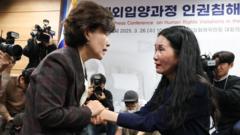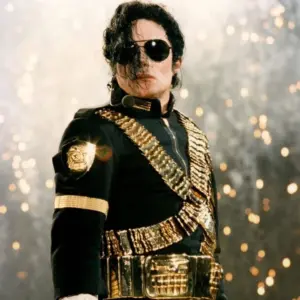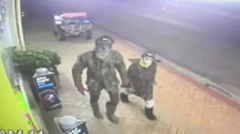A landmark report by South Korea's Truth and Reconciliation Commission highlights human rights violations in the adoption process, revealing systemic failures and profit motives that led to the mass exportation of over 170,000 children since the 1950s.
South Korea's Adoption Scandal: A Dark Chapter Uncovered

South Korea's Adoption Scandal: A Dark Chapter Uncovered
A recent inquiry reveals the shocking abuse and exploitation behind South Korea's extensive child adoption program, admitting to mass exporting of children for decades.
South Korea is grappling with the fallout from a new report that exposes extensive human rights violations in its adoption program, which saw at least 170,000 children sent abroad over several decades. The investigation, led by the Truth and Reconciliation Commission, unveiled deeply troubling practices including fraud, coercion, and inadequate oversight that enabled private agencies to profit from child adoptions, leading to what has been labeled "mass exportation of children."
The inquiry casts a critical light on the government's failure to regulate adoption processes effectively since the program's inception in the 1950s, revealing a modus operandi in which foreign agencies demanded a steady flow of children. The report notes a series of lapses, such as inadequate consent from birth mothers and falsified records that portrayed children as abandoned when they were not, resulting in lives built on falsehoods and trauma for many adoptees.
The commission's chair, Park Sun-young, reflected on the emotional weight of the findings, acknowledging that although many adoptees found loving homes, too many suffered significant hardship. "This is a shameful part of our history," she remarked at a press conference, emphasizing the challenges faced by adoptees as they seek to uncover their identities and origins.
The agency found that out of 367 petitions filed since their investigation began in 2022, 56 adoptees were recognized as victims of human rights violations, with more cases still under examination. The report further criticized the profit-driven nature of adoptions, wherein agencies charged exorbitant fees and labeled these payments as "donations," undermining the ethical standards of child welfare.
Recently, South Korea has taken steps to reform its adoption system, passing legislation to place oversight firmly within government control rather than private hands, set to commence by July 2023. However, the government's response to the commission's report remains awaited.
Among those affected is Inger-Tone Ueland Shin, who shared her painful experience after being illegally adopted by a Norwegian couple at the age of 13. She recounted the trauma of her upbringing, stating, "They took better care of the dog than they ever did of me," and highlighted her struggles adapting to her new life. Despite receiving compensation and acknowledgment of her adoptive parents' wrongdoings, she laments, "I have been living in the wrong country and I have had a painful and miserable life."
As the commission continues its investigations into adoption practices, South Korea is poised to confront this painful aspect of its past, with calls for official apologies and adherence to international standards in transnational adoptions growing louder. The journey towards healing and accountability opens a complex dialogue about adoption and its implications for countless lives intertwined in this dark legacy.



















